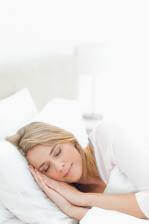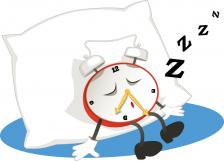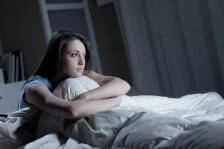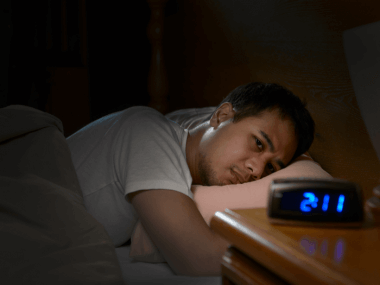Can Melatonin Help You Sleep?
Melatonin is available over the counter as a nutritional supplement. Can taking melatonin help with insomnia or jet lag? Nutrition Diva reviews the evidence.
Nutrition Diva listener Ann writes,
“Would melatonin help me sleep through the night? I never had sleep problems until the past few years. I believe it started with night sweats from pre-menopause but now it seems to be a regular occurrence. My teenaged son also has trouble falling asleep (and has for years). His pediatrician suggested melatonin. It seems to work but I worry that the long-term effects of taking it may disrupt his body’s natural tendency to produce it. Have there been any studies about long-term use of melatonin supplements?”
Many women find it increasingly difficult to get a good night’s sleep as they approach and go through menopause. If you’ve always been a champion sleeper, it can be extremely frustrating and distressing to suddenly lose your ability to sleep through the night. Although it’s not entirely clear how the hormonal changes before and after menopause contribute to mid-life sleep disturbances, one possible explanation is a decline in natural melatonin production.
How Does Melatonin Help You Sleep?
Melatonin is a hormone produced by your pineal gland, which is extremely sensitive to light. Darkness triggers melatonin release, which makes you drowsy. Bright light suppresses melatonin production, which helps you stay alert. This is why you’ll sleep better if you make your room very dark – and why taking a walk in the bright sunlight is one of the best ways to reset your body clock from the effects of jet lag. Melatonin production also falls with age and could be part of the reason that older people tend not to sleep as well.
See also: Can You Exercise to Sleep Better?

You can also buy melatonin tablets at the drug store. Many people swear by melatonin as a “natural” therapy for jet lag and insomnia. Then again, people swear by all kinds of stuff (like that drinking bone broth can boost your immune system) – so what does the research say?
Is Melatonin Effective?
Melatonin seems to work pretty well on kids with insomnia, in particular, kids who also have Attention Deficit Hyperactivity Disorder (ADHD). It seems to help them fall asleep more quickly and sleep better through the night. It’s been studied in kids as young as 6 and through the teen years. Your pediatrician can advise you on the appropriate dose, but most of the studies used doses between 3 and 6 mg given a couple of hours before bedtime.
There’s also good evidence for melatonin is as a treatment for jet lag. Taking 3-5 mg of melatonin about an hour before bedtime at your destination can help you adjust to the new time zone more quickly. It doesn’t seem to work quite as well for shift workers – people who are trying to sleep during the day and work at night.
The evidence for melatonin as a therapy for sleep disturbance due to menopause is not quite as encouraging. Although a recent meta-analysis found some benefit from melotanin, the evidence for another herbal sleep aid, valerian, was a bit stronger.
Finally, the research suggests that melotonin is least likely to be helpful in the elderly and for those with Alzheimer’s Disease.
Is Melatonin Safe?
Melatonin is pretty darned safe – especially compared with the prescription sleep drugs that have flooded the market over the last decade. It is non-habit forming and the most common side effect is…wait for it…drowsiness.
Although it has been widely available over the counter for decades, there have been no reports of toxicity or other problems associated with it. Scientific trials lasting up to 2 years have found no harmful effects either. There is no evidence that using melatonin suppresses the body’s own production of the hormone.

Who Should Not Take Melatonin?
I don’t recommend taking melatonin if you’re pregnant, nursing, or trying to get pregnant. Melatonin can also interact with common medications, including antidepressants, high blood pressure medications, and anti-coagulants (or blood thinners). Check with your pharmacist before mixing melatonin with any prescription medication.
And finally, taking melatonin isn’t a replacement for following these basic rules of sleep hygiene:
- making enough time for sleep
- sleeping on a regular schedule
- avoiding alcohol and caffeine before bed
- turning off the electronics a couple of hours before you go to sleep
- eliminating noise and light pollution in the bedroom
- getting enough exercise
- dealing constructively with things that are causing psychological or emotional stress
In fact, melatonin will probably work a lot better when used as part of a comprehensive approach to improving sleep rather than as a magic bullet.
For more good advice for improving your sleep, see these great resources from my Quick and Dirty Tips colleagues. And if you’re reading this at 3am, here are some strategies from the Savvy Psychologist on how to get back to sleep right now.
References
Bendz LM, Scates AC. Melatonin treatment for insomnia in pediatric patients with attention-deficit/hyperactivity disorder. Ann Pharmacother. 2010 Jan;44(1):185-91.
Costello RB, Lentino CV, et al. The effectiveness of melatonin for promoting healthy sleep: a rapid evidence assessment of the literature. Nutr J. 2014 Nov 7;13:106.
Herxheimer A, Petrie KJ. Melatonin for the prevention and treatment of jet lag. Cochrane Database Syst Rev. 2002;(2):CD001520.
Pigeon WR, Carr M, et al. Effects of a tart cherry juice beverage on the sleep of older adults with insomnia: a pilot study. J Med Food. 2010 Jun;13(3):579-83.









